Night sleep
Daytime naps
Total sleep
10-12.5 hours
2-3.5 hours
12-16 hours

Night sleep
10-12.5 hours

Daytime naps
2-3.5 hours

Total sleep
12-16 hours
When it comes to your 8-month-old baby and sleep, we have good news and bad news: The good news is that at 8 months old, most babies should be sleeping around 12 to 15 hours each day. The bad news is that at 8 months old, sleep regression is very normal.
Fortunately, sleep regressions are an expected part of a baby’s development, and they’re actually a good sign that necessary brain growth is occurring. But they can be difficult to navigate, so here’s more about what to expect from your 8-month-old in terms of sleep, how they are changing, and what you can do to help promote more restful nights.
8-month-old baby sleep milestones
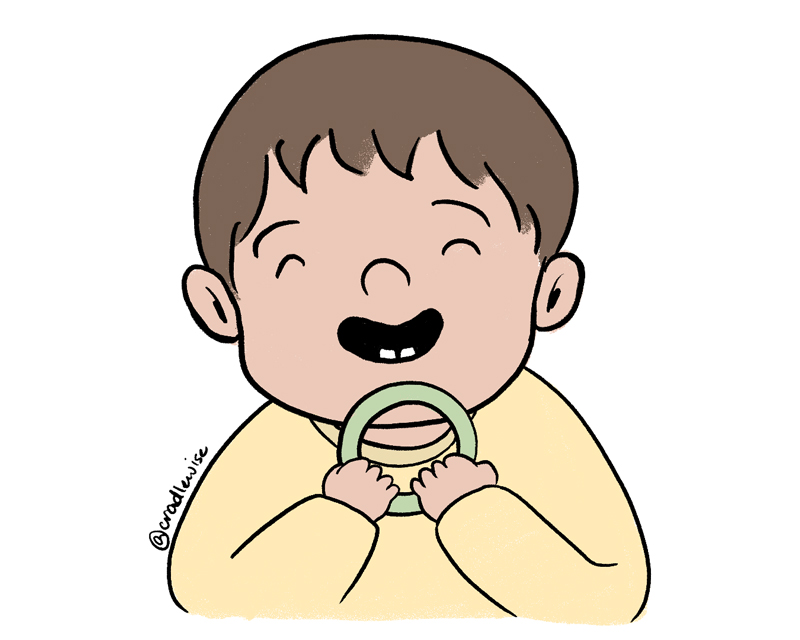
As we mentioned, an 8-month-old sleep regression is something that many babies might experience this month. But why do sleep regressions happen?
The Sleep Foundation explains that sleep regressions can happen in babies anytime they go through a significant leap in their development or growth, whether it’s emotional, physical, neurological, or physical growth (think teething).
As these milestones are reached, your baby’s sleep may be interrupted as their brain learns new patterns and schedules. This can be frustrating, but it’s all part and parcel of having a baby this age. Consistency is key when navigating a sleep regression, so maintaining a bedtime routine will help you get back on track for sleep. (Also key: Maybe a bit of coffee for you!)
8-month old baby milestones
The Centers for Disease Control and Prevention (CDC) does not have specific milestones for an 8-month-old baby, but they list milestones that should happen between 6 and 9 months. By 9 months, the CDC expects them to be doing things like showing fear around strangers (which represents social development), responding to their name, babbling, sitting without support, and crawling (here’s the full list). As always, ask your pediatrician about any concerns.
Activities for an 8-month-old
Just like with younger babies, one of the most important activities you can do with your baby at 8 months old is to play and interact with them. Playing encourages brain development and helps babies learn and grow. It also helps establish sleep-wake cycles to teach their brains when it’s time to be active and when it’s time to sleep.
There is no right or wrong way to play, but if you need some ideas, here are some CDC-approved activities for 8-month-olds:
- Repeat words your baby babbles or give them easy words to say after you, such as “babababa.”
- Set toys just out of reach so your baby has to scoot, crawl, or move to reach them.
- Teach your baby some sign language.
- Read together daily.
- Practice waving “bye-bye” or shaking your head and let them imitate you.
Toys for 8-month-olds
You might have noticed that even with a nursery full of toys, your baby loves things like cardboard boxes and the remote control. But if you want things that can help your 8-month-old’s development, here are some ideas:
- Wooden building blocks: Your baby will be learning to stack blocks and—even more fun—knock them over. Not only does it build fine motor skills, but it also teaches cause and effect.
- Books: Peek-a-boo flaps and touch-and-feel features are always a great idea.
- Sensory toys: Touching and feeling different textures is great for brain development.
- A basic ball: Sometimes simple is best with babies, and a classic, large ball is perfect for rolling back and forth. This game will help your baby practice their new skill of sitting up, and they will absolutely delight in “catching” it when it gets to them.
What’s going on in your baby’s brain?
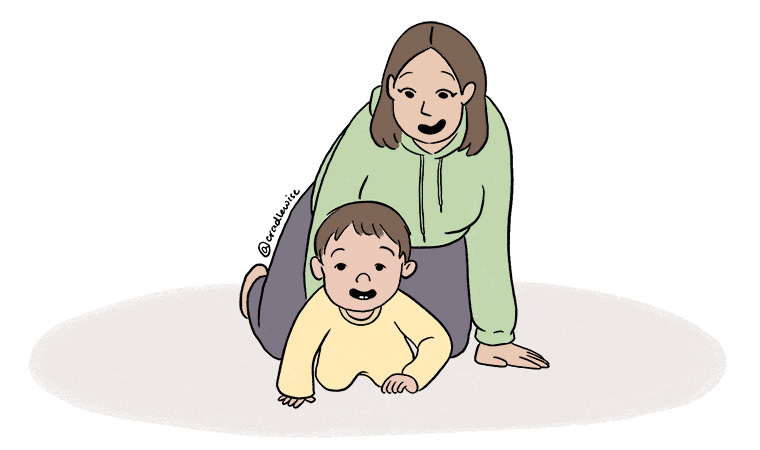
The sleep regressions that can happen around 8 months old are due to a lot of big brain and physical development this month. Just think: A few months ago, your baby couldn’t even sit up on their own, now they are crawling. That’s a huge leap developmentally.
Another big milestone is learning to distinguish themself from you and others. For a long time, babies see you and them as “one,” which explains why they want to be attached to you 24/7, right? This is why separation anxiety can kick in strongly around this age. Additionally, their brains are starting to process emotions, such as being sad or afraid, and that can be overwhelming.
To support your baby’s growth and brain development through nutrition, the American Academy of Pediatrics (AAP) recommends nutrients such as folate, vitamins A and D, protein, iron, and zinc. The AAP also explains that at 8 months, babies can move from purées to more textured foods. Some great food ideas for 8-month-olds include scrambled eggs, bananas, strawberries, and lean proteins like tofu and chicken.

Cradlewise Smart Crib
Smarter Sleep for Your Baby
An award-winning crib—loved by parents, approved by experts.
0 to 24 months of use
Automatic soothing
Built-in video & sound machine
AI-powered sleep insights
Customizable soundtracks
Get 2 extra hours of sleep nightly
How much sleep does an 8 month old need?
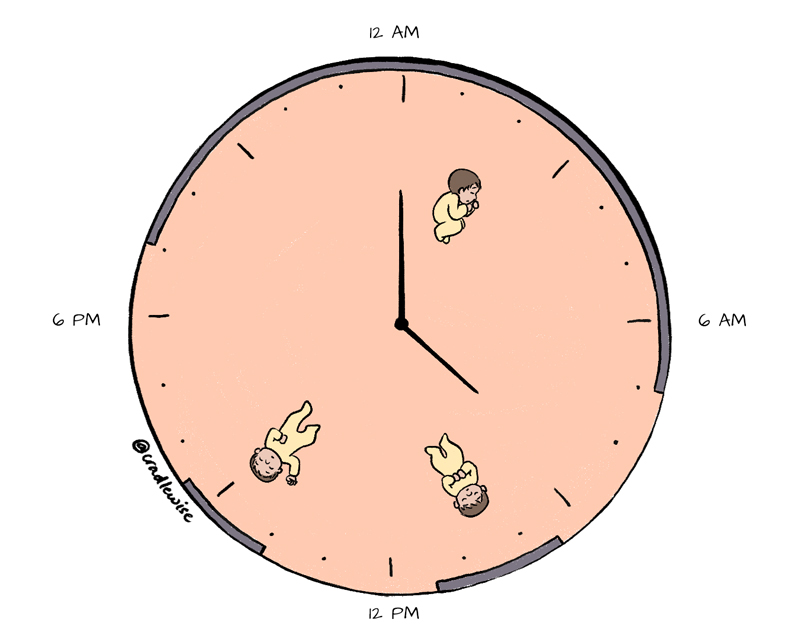
Typically, an 8-month-old baby needs 12 to 16 hours of sleep every 24 hours but some babies will need 13 to 14 hours of sleep.
8 month old wake windows vary as they transition from 3 to 2 naps, so this age can be tricky. On average most 8-month-old babies have a wake window between 2 and 3.5 hours.
At 8-months old your baby will need 2 2-hour naps. Some babies will nap longer. Note: some babies may also still be napping 3 times a day at this age.
Sample 8-month-old sleep schedule
Every baby is different, but here is a sample sleep schedule for an 8-month-old baby. If your baby hasn’t fully transitioned to three naps, you may need to squeeze in a catnap towards the end of the day (around 4 PM) with a slightly later bedtime.
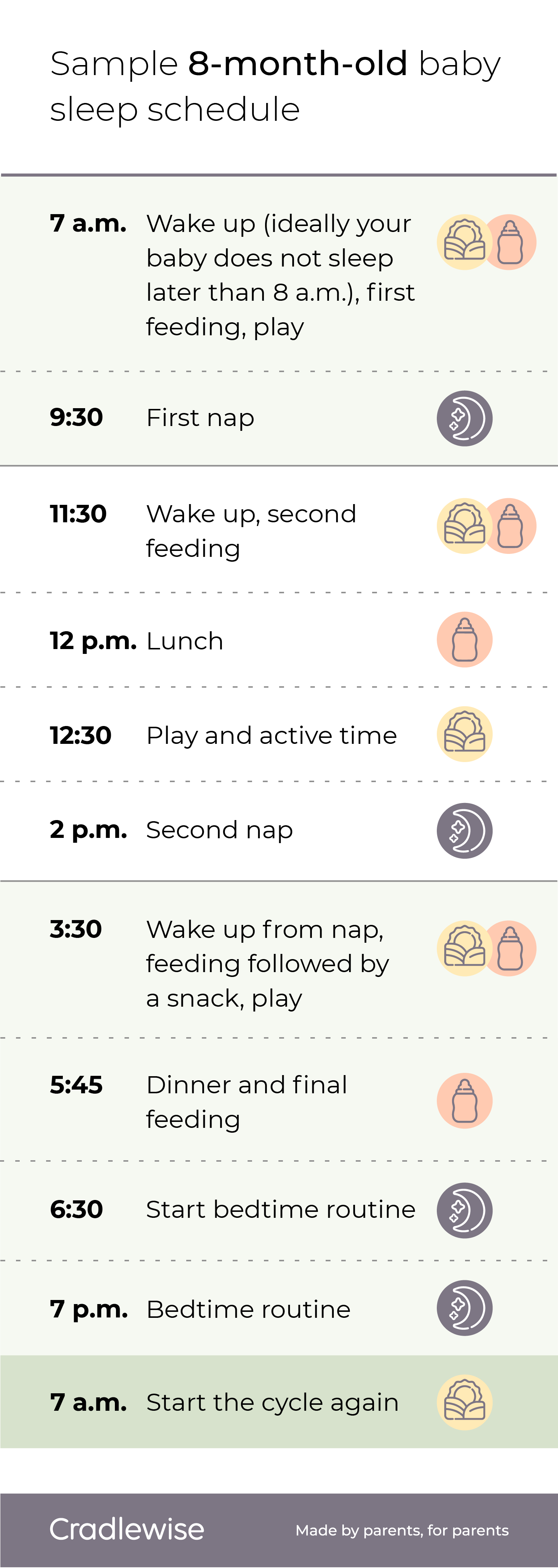

8-month-old feeding tips
As you try out new foods and textures, watch your baby for possible choking. Here’s what else to know.
- How much should an 8-month-old eat: At 8 months old, the AAP says most babies need between 750 and 900 calories per day, with half coming from breast milk or formula. For bottle-fed babies, that amount translates into approximately 24 ounces of milk or formula per day.
If you’re breastfeeding, continue to nurse on demand. If your baby is nursing, they may need to nurse more during times of interrupted sleep, teething, or growth spurts because they need the extra calories or comfort from you. - How much should an 8-month-old weigh: The average 8-month-old baby boy weighs 22 pounds and the average 8-month-old baby girl weighs 19.5 pounds, according to the World Health Organization.
Be sure to keep your baby’s well-child checks with your doctor, so they monitor your baby’s growth. Weight is very individual, so as long as your baby is following the curve on the growth chart, they’re likely eating enough. - How often should an 8-month-old eat: More than half of your baby’s calories should continue to come from breast milk or formula, so you should always nurse your baby or feed them a bottle first at meal and snack times.
After that, your baby can have around 2 to 4 tablespoons of food at mealtime and snack times.
How to support your 8 month old’s sleep
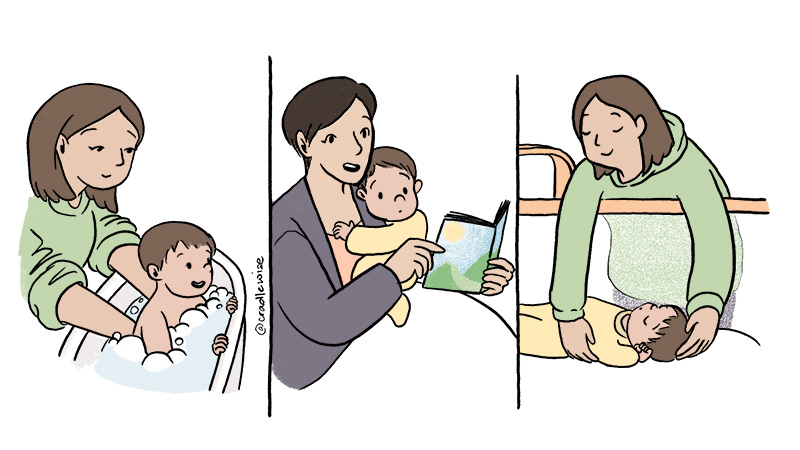
During your baby’s eighth month, it can be helpful to keep the following sleep tips in mind:
Stay flexible with naps.
Eight months can be a weird stage for sleep, especially if your baby attends daycare. Your provider may be offering two naps but your baby might need three, so they may be extra tired those days and need an early bedtime. Don’t force the transition from three naps to two and allow your baby the extra sleep when they seem to need it. Sleep begets sleep, so it’s ok to follow your child’s cues.
Aim for a bedtime that’s 8 PM or earlier.
Many sleep experts recommend that babies are in bed by 8 PM to help avoid nighttime awakenings, difficulty going to bed, and other sleep disturbances. This may require some rejiggering of your evening routine. If you’re pressed for time, keep the before-bed ritual short: That might mean skipping extended play in the bathtub and reading just one favorite board book.
Stash an extra pacifier.
Is your baby still using a pacifier at night? With their newfound fine motor skills, this is about the age where they might be able to bring one to their mouth without extra help. Try placing one or two extra pacifiers in their Cradlewise at bedtime, so if the first one falls out, they’ll have a better chance of finding a replacement.
FAQs
Q: Can an 8-month-old sleep through the night?
A: Most babies are able to sleep through the night by 8-month-old, but all babies are different. If your baby still needs a night feed at the 8-month mark, that’s totally fine.
Q: How many naps should an 8-month-old take?
A: Two 2-hour naps, some babies will nap longer. Note: some babies may also still be napping 3 times a day at this age.
Sources:
- Sleep regression. 2022. Sleep Foundation. 8-Month Infant Sleep Regression.
- Nine-month-old baby milestones. 2022. Centers for Disease Control and Prevention. Important Milestones: Your Baby By Nine Months.
- Recommended nutrients for brain health. 2022. UCLA Health. Baby brain food: 7 foods to fuel brain development.
- Food for eight-month-olds. 2022. Healthy Children.org. Sample Menu for a Baby 8 to 12 Months Old.
- Growth charts. 2022. World Health Organization. WHO Growth Standards Are Recommended for Use in the U.S. for Infants and Children 0 to 2 Years of Age.
- How much to feed your baby. 2022. Centers for Disease Control and Prevention. How Much and How Often To Feed.




